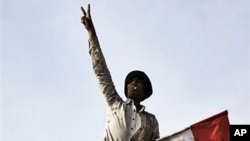Anti-government demonstrators in Egypt are preparing for another massive protest Friday to further pressure President Hosni Mubarak to leave power. The streets of the capital have been the scene of bloody battles between opposition demonstrators and supporters of Mr. Mubarak.
Anti-Mubarak demonstrators are calling Friday Hosni Mubarak's day of departure. Bloodied and beaten from clashes with the president's supporters, they hoped their sustained pressure will make the 82-year-old Egyptian leader will go immediately.
|
Key Players in Egypt's Crisis
|
Mr. Mubarak has been in power for nearly thirty years and this week sought to halt the protests by announcing he will not seek re-election in September elections.
The Egyptian leader gave his first interview since the protests began. He spoke off-camera with journalist Christiane Amanpour of the U.S. television network ABC and told her he is fed up and wants to go. Amanpour quotes the president as saying that if he goes now, there would be chaos in Egypt and the Muslim Brotherhood would take over.
Thursday saw more gunfire in the area and heavy fighting in the streets around Tahrir Square in Central Cairo.
The army brought in reinforcements and soldiers prevented protesters from both sides from entering the area around the square. Police carried out a wave of arrests.
Egyptian Prime Minister Ahmed Shafik went on state television to apologize for the violence and denied government involvement in the clashes.
The anti-government demonstrators are not convinced. They accuse the government of encouraging, or at least allowing the pro-Mubarak demonstrators to approach and strike the anti-government demonstrators.
This 20-year-old opposition protester says President Mubarak's supporters staged an angry attack on Tahrir Square.
"There was big violence," said the protester. "All that area I was in was full of Mubarak's guy's Mubarak's people."
Mubarak supporters targeted foreign journalists, accusing the foreign media of instigating the protests. A large number of international reporters say they have been harassed, beaten, mobbed, or detained.
With police off the streets at least for a few days, demonstrators have had a week of unprecedented freedom to express their anger toward Mr. Mubarak. By Thursday, with plain clothes agents on the streets and threatening those who talked to reporters, signs of the old police had returned.
The demonstrator who spoke to VOA did so away from the street. He says the demonstrations have gone too far to go back, and he intends to return to the square and continue protesting.
"We are Egyptian," said the demonstrator. "We have a brave heart. We have to get our freedom. This is 30 years without freedom in Egypt."
Mubarak's government has called for a dialogue with the opposition but says no negotiations can begin until the protests end. The opposition wants Mubarak out of office, out of the country, or put on trial.




